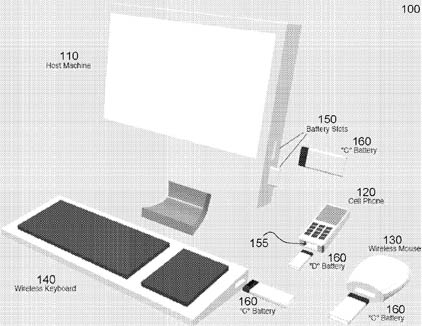Apple to go back to user-replaceable batteries?

A patent application uncovered by The Register seem to indicate that Apple is interested in making batteries user-replaceable.
Beginning with the iPod, Apple has increasingly sealed its batteries inside its mobile devices. Today, only the MacBook and 15-inch MacBook Pro have user-serviceable batteries. The entire iPod line, iPhone, 17-inch MacBook Pro, and MacBook Air all have their batteries locked inside. They require either a warranty-busting case-cracking or the ministrations of an authorized service technician for replacement.
But these filings point to a day when an assortment of different-sized batteries could be popped into the aforementioned host machine to be charged, then swapped into and out of a broad range of mobile devices, including mice, keyboards, speakers, mp3 players, personal digital assistants, cell phones, laptop computers, microphones, headphones, and headsets.

It's far too soon to read too much into this patent filing and could be little more than blue-sky thinking. In fact, given Apple's love affair with non-user-replaceable batteries at the moment (a feature which I see as a built-in obsolescence time-bomb ... or at the very least a trickle income stream from warranty repairs) I don't expect any huge shift to replaceable batteries soon.
My guess is that Apple may be coming up with a backup plan in case their current approach to batteries starts drawing legal attentions, in particular from the EU. There are some people who see non-user-replaceable batteries as a crime against the planet, and should this kind of thinking gather support, Apple will need an escape route.
Also filed were patents for technology where host devices would communicate wirelesslywith mobile devices to monitor battery levels, and another for intelligent universal rechargeable batteries.